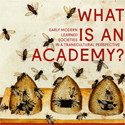
International Conference organised by the Collaborative Research Center “Episteme in Motion” (FU Berlin) in collaboration with the Berlin-Brandenburg Academy of Sciences and Humanities.
The conference sets out to challenge certain broadly accepted assumptions about early modern academies. We propose to revisit the fundamental question of what qualifies an institution of learning as an ‘academy’ in the early modern period. What were the structures, functions, and especially the forms of communication specific to academies and how did they differ from or converge with comparable institutions of learned sociability such as humanist sodalitates, private learned circles, Masonic lodges, salons, or tertulias? What genealogies and models informed the idea of the institution, and how did they relate to the actual practices of a given academy? What was the relationship between academies and the universities and what role did the oft-neglected transfer of knowledge between these institutions play? And how did the Enlightenment affect this history?
In order to explore these questions, we invited contributors to adopt a transcultural perspective on the phenomenon of early modern learned societies. While we are particularly keen to include contributions on academies in the Americas and Asia, we are most interested in understanding academies as nodes in transcultural entanglements. Although scholars have begun to study academies in a comparative perspective in the last decades, they have often tended to consider these institutions as regional (or even national) modifications of a given institutional type. In contrast, we ask participants to explore how the specific features of academies were shaped by a dialogue between historical models and contemporary socio-cultural contexts.
The conference pertains to the framework of the Collaborative Research Centre (SFB) „Episteme in Motion,“ which investigates processes of knowledge transformation in pre-modern cultures, both European and non-European. This phenomenon merits particular attention since knowledge within these cultures has often been considered as stable, both from an inside perspective and from the outside. The Centre’s key postulate is that in all ‘traditions’ and apparently stable systems of knowledge, epistemic change is a constant. This is frequently a long-term, subtle process, modifying existing knowledge and tacitly integrating novel elements, and it cannot be explained with the tools of a traditional history of science that relies on concepts of rupture and revolution as indicators of progress.
Planning committee: Mira Becker-Sawatzky, Isabelle Fellner, Martin Gehlmann, Eun-Jeung Lee, Ulrike Schneider, Anita Traninger, Martin Urmann
Please register by sending an email to Kristina Kaltenbach
Further Information: Martin Urmann

